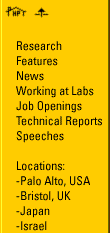| |
HP Labs Technical Reports
Click here for full text:


Quality of Service Aware Distributed Object Systems
Frolund, Svend; Koistinen, Jari
HPL-98-142
Keyword(s): QoS-specification; QoS-enabled Trading; distributed object systems; object component specification; object interoperability
Abstract: Computing systems deliver their functionality at a certain level of performance, reliability, and security. We refer to such non-functional aspects as quality-of-service (QoS) aspects. Delivering a satisfactory level of QoS is very challenging for systems that operate in open, resource varying environments such as the Internet or corporate intranets. A system that operates in an open environment may rely on services that are deployed under the control of a different organization, and it cannot per se make assumptions about the QoS delivered by such services. Furthermore, since resources vary, a system cannot be built to operate with a fixed level of available resources. To deliver satisfactory QoS in the context of external services and varying resources, a system must be QoS aware so that it can communicate its QoS expectations to those external services, monitor actual QoS based on currently available resources, and adapt to changes in available resources. A QoS-aware system knows which level of QoS it needs from other services and which level of QoS it can provide. To build QoS-aware systems, we need a way to express QoS requirements and properties, and we need a way to communicate such expression. In a realistic system, such expression can become rather complex. For example, they typically contain constraints over user-defined domains where constraint satisfaction is determined relative to a user-defined ordering on the domain elements. To cope with this complexity we are developing a specification language and accompanying runtime representation for QoS expressions. This paper introduces our language but focuses on the runtime representation of QoS expressions. We show how to dynamically create new expressions at runtime and how to use comparison of expressions as a foundation for building higher-level QoS components such as QoS-based traders.
15 Pages
Back to Index
|




